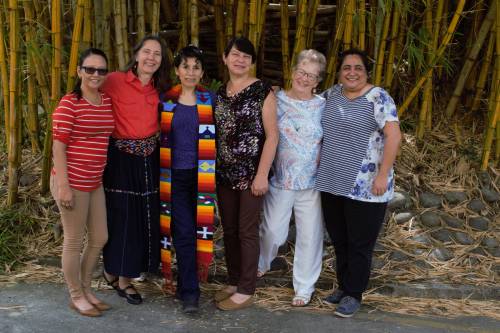A Letter from Karla Koll, serving in Costa Rica
Fall 2022
Write to Karla Ann Koll
Individuals: Give online to E132192 in honor of Karla Ann Koll’s ministry
Congregations: Give to D500115 in honor of Karla Ann Koll’s ministry
Churches are asked to send donations through your congregation’s normal receiving site (this is usually your presbytery)
Subscribe to my co-worker letters
Dear friends,
This month, the Latin American Biblical University (UBL) celebrates 100 years of providing theological education here in Costa Rica. In honor of our centennial, I drafted a letter to Susan Strachan, the British missionary who founded our institution as an interdenominational women’s Bible school. The UBL has been a mission partner of the Presbyterian Church (USA) since the 1970s. With profound thanks for your ongoing support for our work in theological education, I share this letter with you.

The first class with Susan Strachan on October 2, 1922
Dear Sister Susan Strachan,
Exactly 100 years ago, you achieved your dream of founding a Bible school to train women for evangelistic work. How many times have I looked at that photograph of the first class, with you seated in front of the chalkboard and the eight young women sitting around the table? We know their names: Olivia Rodríguez, Ángela Santamaría, Concha Escobar, Piedades Gómez, Betty Campos, María Pineda, Isabel Zúñiga and Fanny Hogg. What we don’t know is what they were thinking as they started their studies. What went through their minds as they listened to you with your British-Argentine accent talk to them about the Bible? How did you feel when you put Bibles into their hands?
We understand that each one of them came recommended by a mission. Therefore, they were already familiar with the evangelical version of the Gospel. However, many times in their lives they surely had heard the Catholic priests say that the Bible was a very dangerous book that should not be in the hands of ordinary people, much less of women. How daring these young women were, embarking on this adventure of studying the Bible in this school in San Jose!
María Pineda and Concha Escobar had traveled from El Salvador. It must have been a difficult journey at that time, without highways and probably on muleback at least part of the way. How many hundreds of students in these 100 years have come to spend years here in Costa Rica, far from their families, to receive a theological education?
Reportedly, you reacted with great enthusiasm when you received the telegram from your husband, Harry, with the news that 10 Nicaraguan men wanted to come to San Jose to study. I wonder if you did not stop for a moment to think about what it would mean to lose this space where women were studying the Bible together. Or did you earnestly believe, as you wrote a short time later, that the work of training men was much more important than the work that you had been doing with women? And just what did the young women think when they learned they would be sharing their classroom with men?
I see in the photograph taken for the first graduation held on July 21, 1926, that only three of the women finished their studies. What happened to the others? Did they become discouraged along the way?

Women of the UBL today (left to right): Registrar Vanessa Zúñiga, Professor Karla Ann Koll, Graduate Elena Quichca of Peru, Professor Ruth Vindas, Volunteer Margie Miller, and Online Education Coordinator Texia Anabalon.
As an entrance requirement, you insisted that each woman accepted by the school had to have a commitment from the church or the mission that recommended her to provide her with employment when she finished her studies. It was very important to push for jobs, hopefully with salaries attached, for women in the churches and mission organizations. However, is it possible that your insistence became an obstacle for many women? I wonder how many women were left with only their desire to study because they did not have the support of the male leaders of their churches.
I would love to be able to tell you that now, 100 years later, the gifts of women are being recognized in the churches, that women with Biblical and theological training are accepted as leaders in the congregations, and that women can teach in many seminaries and Bible institutions. It makes me sad to say that it continues to be a struggle to open spaces for women in the churches in Latin America.
From the beginning of the institution, you insisted that theological training should be available to people who did not have the economic resources to pay for their studies. You invited people in the United States and Canada to support students with their prayers and their donations. I am happy to tell you that the institution has been able to continue through all of these years because people in other places around the world have believed in our educational project as well as in the capacity of our graduates, women and men, to be agents of change in their churches and their communities.
We understand that you directed the institution from the beginning, first with your husband, Harry, and later with your son Kenneth. The letters in the historical archive show that you took charge of many of the administrative details to keep the institution going. We had to wait many years, until 1995 when Elsa Tamez became the president, to see another woman direct the Latin American Biblical University.
In your writings about the beginning of the Women’s Bible Training School, you argued that the task of evangelizing Latin America required the efforts of women. We continue to believe that women with theological training have an important role in the processes of transformation that the churches, the communities, and the societies of Latin America and the Caribbean need.
As our beloved university celebrates a century of theological education, we want to thank you for having dreamed of a space where women could study the Bible. We affirm our commitment to continue to put the Bible into the hands of women while we work for just societies that will protect the life and dignity of all persons. We continue to invite women (and men) to embark on the adventure of studying theology.
With many thanks,
Karla Ann Koll
Please read the following letter from Rev. Mienda Uriarte, acting director of World Mission:
Dear Partners in God’s Mission,
What an amazing journey we’re on together! Our call to be a Matthew 25 denomination has challenged us in so many ways to lean into new ways of reaching out. As we take on the responsibilities of dismantling systemic racism, eradicating the root causes of poverty and engaging in congregational vitality, we find that the Spirit of God is indeed moving throughout World Mission. Of course, the past two years have also been hard for so many as we’ve ventured through another year of the pandemic, been confronted with racism, wars and the heart wrenching toll of natural disasters. And yet, rather than succumb to the darkness, we are called to shine the light of Christ by doing justice, loving kindness and walking humbly with God.
We are so grateful that you are on this journey as well. Your commitment enables mission co-workers around the world to accompany partners and share in so many expressions of the transformative work being done in Christ’s name. Thank you for your partnership, prayers and contributions to their ministries.
We hope you will continue to support World Mission in all the ways you are able:
Give – Consider making a year-end financial contribution for the sending and support of our mission personnel (E132192). This unified fund supports the work of all our mission co-workers as they accompany global partners in their life-giving work. Gifts can also be made “in honor of” a specific mission co-worker – just include their name on the memo line.
Pray – Include PC(USA) mission personnel and global partners in your daily prayers. If you would like to order prayer cards as a visual reminder of those for whom you are praying, please contact Cindy Rubin (cynthia.rubin@pcusa.org; 800-728-7228, ext. 5065).
Act – Invite a mission co-worker to visit your congregation either virtually or in person. Contact mission.live@pcusa.org to make a request or email the mission co-worker directly. Email addresses are listed on Mission Connections profile pages. Visit pcusa.org/missionconnections to search by last name.
Thank you for your consideration! We appreciate your faithfulness to God’s mission through the Presbyterian Church (U.S.A.).
Prayerfully,

Rev. Mienda Uriarte, Acting Director
World Mission
Presbyterian Mission Agency
Presbyterian Church (U.S.A.)
To give, please visit https://bit.ly/22MC-YE.
For it is the God who said, ‘Let light shine out of darkness,’ who has shone in our hearts to give the light of the knowledge of the glory of God in the face of Jesus Christ. 2 Corinthians 4:6
![]() You may freely reuse and distribute this article in its entirety for non-commercial purposes in any medium. Please include author attribution, photography credits, and a link to the original article. This work is licensed under a Creative Commons Attribution-NonCommercial-NoDeratives 4.0 International License.
You may freely reuse and distribute this article in its entirety for non-commercial purposes in any medium. Please include author attribution, photography credits, and a link to the original article. This work is licensed under a Creative Commons Attribution-NonCommercial-NoDeratives 4.0 International License.